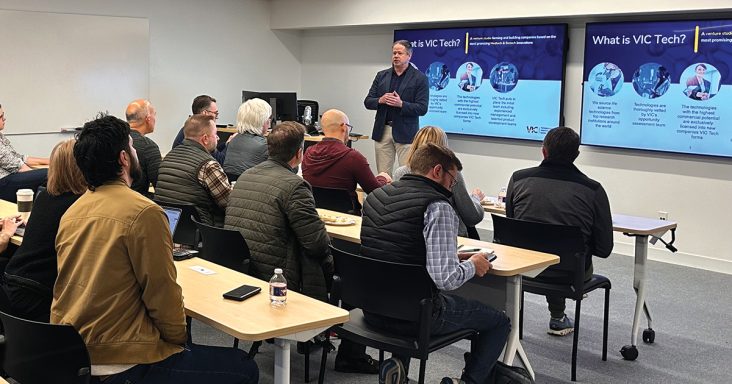Calvin Goforth shares optimistic outlook on venture capital in 2024
by March 3, 2024 8:05 am 812 views

Calvin Goforth, chairman and CEO of VIC Technology Venture Development in Fayetteville, said that despite a challenging year for venture capital funding, 2023 was a year of significant progress for VIC portfolio companies.
2023 was a challenging year for venture capital fundraising, but Calvin Goforth sees signs that the bottleneck will loosen up this year.
“The fundraising environment is improving,” he said in a recent interview. “We’ve already seen some evidence of that [with] some new deals, new investments. It’ll be better, which will help us. And not just us. Any company that’s in the venture capital stage.”
Goforth is chairman and chief executive of arguably one of the state’s best-kept secrets — VIC Technology Venture Development, a venture development team based at the Arkansas Research and Technology Park in Fayetteville.
Goforth launched VIC as a consulting company in 2000. It’s evolved into a “studio” model for creating life sciences companies — therapeutics, vaccines, medical devices, diagnostics and materials — with branch offices nationwide. Last year, VIC opened its sixth office in Minneapolis, a medical-tech innovation and manufacturing hub, joining its offices in Fayetteville; Boulder, Colo.; Albuquerque, N.M.; Dallas; and San Francisco.
The branch offices house experienced executive-level employees who act as interim CEOs for new portfolio companies in their region.
VIC focuses its work on these three areas:
- Forming new technology companies to commercialize licensed technologies.
- Offering a business development team to provide initial leadership and support for these new ventures.
- Providing management and corporate services to portfolio companies on a cost-sharing basis.
Essentially, the VIC team scouts for the most promising medical intellectual properties from research universities worldwide and uses a rigorous vetting process to find the best technologies with substantial commercial potential and societal benefits. It then purchases the IP and leverages its robust network of business leaders to build the company, providing experience that can be quickly adjusted to meet company needs while minimizing cash burn.
The ultimate goal is to advance these technologies toward exit through acquisition.
VIC’s expanding collection of companies — there are 16 in the portfolio — is overseen by accomplished business leaders and supported financially by venture capital from the VIC Investor Network (VIN) and other co-investors.
“There are no other life science venture creators in Arkansas,” said Paige Jernigan of Bentonville, who has raised money for nonprofits, individuals and startups around the globe. She’s helped raise capital for VIC but is also a “huge believer” and an investor. “It’s uniquely positioned to help the new health focus in Northwest Arkansas grow exponentially by building a life science workforce beyond just creating jobs and creating an entrepreneurial mindset around health.”
CATALYSTS FOR GROWTH
The VIC innovation ecosystem has blossomed in the past decade to include multiple elements:
- VIC Foundry, a tech incubator stood up in 2019 to develop a pipeline of new technologies as IP foundations for future VIC portfolio companies.
- VIC Fellows, a program launched in 2020 for individuals with specific expertise to learn about and be involved in the process of identifying and evaluating promising life science and technology innovation.
- VIC Investor Network (VIN), a nationally comprised angel investor network.
“We started as a consulting company, but what we are doing today started with forming the VIC Investor Network in 2013,” Goforth said.
The VIC Investor Network places between $250,000 and $500,000 into every new portfolio company that VIC forms. The infusion of funding enables VIC to launch its latest portfolio companies rapidly and notably reduces the average development time for each company.
Some portfolio companies include:
- BiologicsMD treats hair loss and bone disorders, such as the loss of bone density.
- Cardiowise connects cardiac CT data with next gen AI algorithms to create a 3D model of the heart, allowing faster and more accurate diagnosis of how well a patient’s heart is functioning or pumping blood.
- Nobhill Therapeutics is the only dry powder nebulizer to deliver drugs deep into the lungs for cancer, bacteria complications, etc.
Despite a challenging year for venture capital funding, Goforth said both the VIC Tech and portfolio company teams demonstrated adaptability and perseverance in 2023, leading to significant progress.

“The simultaneous challenges of a liquidity crunch and a closed IPO window have limited the avenues for capital infusion for startups at various VC stages,” Goforth wrote in a note to supporters and investors in early January. “VIC Tech and the VIC Investor Network have helped our companies through funding gaps, and our companies have been persistent in reaching out to new investors as well as seeking non-dilutive funding.”
Goforth shared that it was a “banner year” for VIC portfolio companies in receiving non-dilutive funding, with several Phase I and II multimillion-dollar federal grant awards.
“That helped our portfolio manage the difficult venture capital environment while simultaneously reducing dilution to VIC and VIN investors,” he said.
In 2023, VIC portfolio companies showed significant advancement across various sectors. However, VIC observed the most notable progress in the medical device portfolio. Key milestones include:
- Securing $50 million in Series D funding for Calyxo, a next-gen solution for kidney stones.
- Attracting lead investment interest from a potential strategic acquirer for another company.
- Achieving significant strides in mass manufacturing and scaling up for a third company.
“Our VIC Investor Network continues to provide outstanding returns to our investors,” Goforth wrote. “VIN members have seen an estimated 38% IRR [internal rate of return] combined across all investments made since the formation of the network in 2013, including both realized and unrealized returns.”
Goforth said VIC continues to raise capital to fuel expansion.
“We hope to form between two and four companies this year,” he said. “We think that is a realistic goal. We think the value growth will be very high across the portfolio. It’s possible there could be an exit this year.”
VIN aims to attract investors by offering highly attractive valuations, particularly appealing to experienced technology investors seeking high returns and newcomers looking for low minimum commitments and reduced risk. It allows accredited investors to hold equity in multiple high-growth companies.
Jernigan acknowledged that a critical consideration for investors is the portfolio company’s exit strategy, impacting timeline and risk level. Investing in early-stage life science companies is risky due to lengthy development cycles and regulatory obstacles.
Despite challenges, potential rewards are substantial for investors willing to take the risk.
“The financial upside of life science companies can be huge,” she said.
